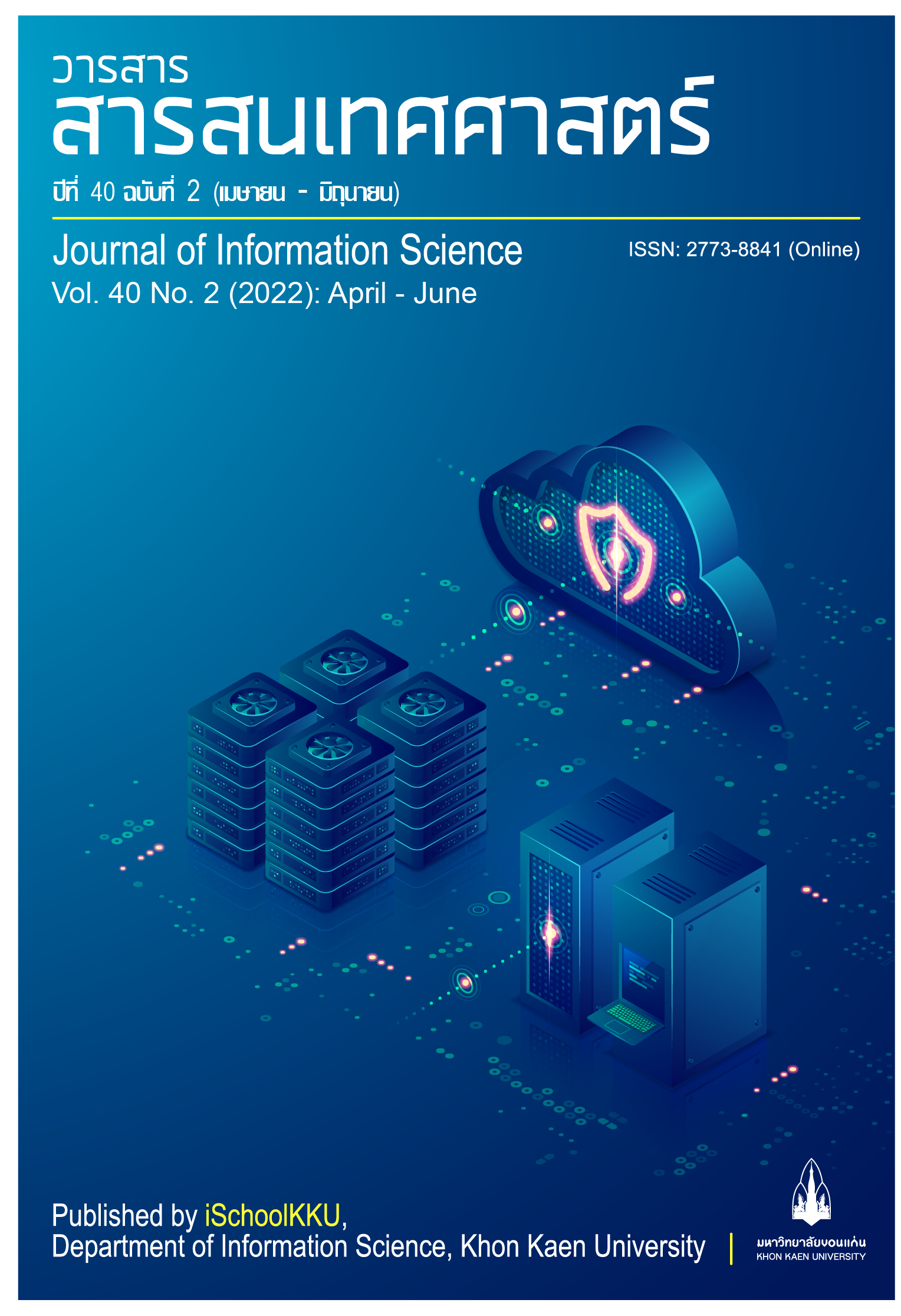The Competency of Teacher Librarians for Providing School Library Services Smart
DOI:
https://doi.org/10.14456/jiskku.2022.13Keywords:
Teacher librarian, School library, Covid-19Abstract
Purpose: To analyze the knowledge and ability of teacher librarians for providing school library services smart.
Methodology: Survey research method was employed. The researcher used a questionnaire to collect data from a quota sampling of teacher librarians working in school libraries under Educational Service Area Offices throughout Thailand. 323 school librarians participated. In which, the researcher conducted in-depth interviews with 16 school librarians of primary schools under the Office of Primary Education Region 1, Khon Kaen Province. Quantitative data were analyzed by using statistics. Percentage, Mean, and Standard Deviation while qualitatively using content analysis.
Findings: Most teacher librarians do not have a degree in librarian science or related fields. Only 19.81 percent of teacher librarians have graduated in librarian science. Most of them were assigned from school administrators to be responsible for school libraries, volunteered to work at school libraries, and rotate to take care of school libraries. In terms of the competence of teacher librarians, teacher librarians had the highest library services capacity ( = 2.24), while their capacity to collaborate with communities had the lowest average ( = 1.99). In which was consistent with the results of the study from the interview, teacher librarians have the capacity to provide school library services, especially reading promotion services; however, they still lacked of competence in using information technology for library administration and services.
Applications of this study: Library schools and elementary schools can apply the research results to develop library plan as well as school librarians’ competency in order to use for school library services and management and be consistent with library's services in the next normal.
Downloads
References
Ameen, K. (2021). Covid-19 Pandemic and role of libraries. Library Management, 42 (4-5), DOI: 10.1108/LM-01-2021-0008
Grover, R. & Bilbert, S. (2020). The new virtual reality: Surviving and thriving as a school librarian during a pandemic. Retrieved 27 February 2022 from https://knowledgequest.aasl.org/the-new-virtual-reality-surviving-and-thriving-as-a-school-librarian-during-a-pandemic/
KKU Smart Learning. (2019). Smart learning academy. Retrieved 30 December 2020 from https://www.kkusmartlearning.com/main/index.php/2019-06-09-21-35-05/about-us
Kwiecien, K., Chuenchom, S., Chitiyaphol, J. & Hoaihongthong, S. (2021). A Study of School Librarian’s attributes at Primary school libraries in Thailand under the covid-19 pandemic. Proceeding of the 4th I-Liss International Conference-IIC2021: Transition or transformation of Libraries due to Covid pandemic: Lessons to Learn. International Library and Information Science Society and SRM Institute of Science and Technology, Tamil Nadu, India.
Lo, P., Chen, J.C.C., Dukic, Z., Youn, Y. Hirakue, Y., Nakahima, M., & Yang, G. (2014). The roles of the school librarians as information literacy specialists: a comparative study between Hong Kong, Shanghai, South Korea, Taipei and Japan. New Library World, 115, (7/8), 314-339.
Lo. P. & Chiu, D.K.W. (2015). Enhanced and changing roles of school librarians under the digital age. New Library World, 116 (11/12), 696-710.
Office of the Basic Education Commission. (2021). The Ministry of Education has postponed the school start date from June 1 to June 14. (In Thai). Retrieved 24 March, 2022, from https://www.obec.go.th/archives/436838.
Tabassum, F., Batool, S.H., Ameen, K., & Hassan, M. (2018). Status of school libraries and developmental issues in Pakistan: a case study of public high schools. Global Knowledge, Memory and Communication, 68 (4/5), 377-391.
Umar, T. & Nasrullah. (2021). School Librarians during the Covid-19. Khizanah al-Hikmah Jurnal Ilmu Perpustakaan Informasi dan Kearsipan, 9(1), 68 DOI: 10.24252/v9i1a8
Wickramanayake, L. (2015). Where to from here? Current status of school libraries in Sri Lanka: A Survey. New Library World, 117 (3/4), 214-228.








